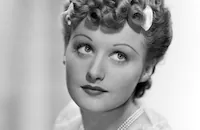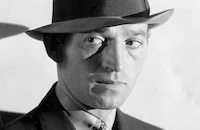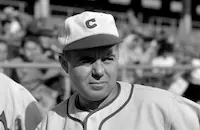My Buddy
Brief Synopsis
Cast & Crew
Steve Sekely
Donald Barry
Ruth Terry
Lynne Roberts
Alexander Granach
Emma Dunn
Film Details
Technical Specs

Synopsis
Father Jim Donnelly travels from Chicago to Washington, D.C. to testify before Senator Bill Henry's Post-War Planning Committee. To illustrate his point that World War II veterans must have jobs waiting for them upon their return from fighting, Father Donnelly tells the story of Eddie Ballinger, a former parishioner and World War I veteran: On 11 Nov 1918, Eddie and his pal Spats are trapped on the battlefield by a German sniper, who is keeping them pinned down in their trench. Spats sings "My Buddy" to assuage their nerves, but when he stands up, the sniper shoots and kills him. Before Eddie can return fire, he receives word that the war is over. Back home in Chicago, Eddie's mother Mary is thrilled to see him, although Eddie is shocked to learn that she has been taking in laundry to make ends meet. Eddie also goes to see his girl friend, Lucy Manners, who has patiently waited for him. Eddie asks Lucy to wait a little longer for their marriage, until he finds a job and readjusts to civilian life. Despite Eddie's persistence and good intentions, he cannot find a job, as very few employers held positions for workers who went off to war. Desperate to provide for Mary and Lucy, Eddie finally accepts a job working for Tim Oberta, a racketeer and bootlegger. Lucy asks Eddie to quit, but Eddie continues with his illegal activities and is able to install Mary in a comfortable new apartment. Later, Eddie is helping to deliver a truckload of gin when an investigating policeman is accidentally killed. Oberta double-crosses Eddie during his trial, and Eddie is convicted and sentenced to five years in prison. The bitter Eddie then begins to lay plans for his own criminal empire during his imprisonment. Lucy visits Eddie, but he cruelly tells her to go on with her life and marry a respectable, boring man. Upon his release in 1924, Eddie moves in on Oberta's territory and soon has control of the westside protection racket. Eddie begins keeping company with Lola, a duplicitous nightclub performer who left Oberta for him. Mary pleads with Eddie to quit terrorizing the shopkeepers for protection money, but Eddie refuses, for he is still angry over their refusals to employ him when he returned from overseas. Eddie's empire grows, but a spy for Oberta helps him to set up and murder several of Eddie's men, and in revenge, Eddie shoots Oberta. After the shooting, Eddie leaves a valise at Donnelly's church, then goes to the hotel, where Lola is waiting for him. Lola has called the police, however, and Eddie is killed in the ensuing shootout. At the conclusion of his story, Donnelly tells the senators that Eddie's valise contained money to be returned to the store owners, and a note begging Donnelly to help provide for the men and women who will be serving their country in the future. Moved by the saga of Eddie's downfall, the senators promise Donnelly that they will do all they can to insure job security for returning veterans.

Director
Steve Sekely
Cast

Donald Barry
Ruth Terry

Lynne Roberts

Alexander Granach
Emma Dunn

John Litel

George E. Stone

Jonathan Hale

Ray Walker
Joe Devlin
Matt Mchugh
George Humbert
Gayne Whitman
Edward Earle

Emmett Vogan
Jimmy Zaner
Jack Baxley
Connie Leon
Milton Kibbee
Almeda Fowler
Sam Bernard

Blake Edwards
Sven-hugo Borg
George Lloyd
Lee Shumway
George Sherwood
Ed Cassidy
Frank Pershing
Wallace Pindell
Tom London
Harry Strang
Marshall Reed
Roy Darmour
Lynton Brent
Jack Gardner
Russ Whiteman
Boots Brown
Robert Middlemass
Nolan Leary
Ralph Linn
Frank Marlowe
Charlie Sullivan
Jack Raymond
Larry Steers
Jack Rockwell
Charles Sherlock
Kid Chissell
John Bagni
Jay Norris
Poison Gardner Trio
Arthur Loft
Dick Moorehead
Bud Geary
Charles Wilson
Eddie Hall
Sammy Finn
Jack Mulhall
Larry Burke
Leroy Mason
Constance Purdy
Crew
Adele
Billy Baskette
Prescott Chaplin
Walter Donaldson
Jack Elliott
J. Frank Hotaling
Gus Kahn
Reggie Lanning
Arnold Manoff
Tony Martinelli
Joe Popkin
Armand Schaefer
Morton Scott
Dick Tyler
Eddy White
Earl Woodin

Film Details
Technical Specs

Quotes
Trivia
Notes
The following written dedication appears after the opening credits: "This picture is dedicated to our boys and girls in the armed forces and to the task of reminding us that we must prepare our great land for their return to civilian life, so that they shall come back free men and women to a land of peace and security and equal opportunity for all." The popular 1920s song "My Buddy" was not written until 1922, although in the film it is sung in 1918, at the end of World War I. "Eddie" identifies the song with his fallen comrade, "Spats," and is reminded of Spats when he hears the song again while serving time in prison. Although Hollywood Reporter production charts include Kenne Duncan in the cast, his appearance in the completed film has not been confirmed. According to information in the MPAA/PCA Collection at the AMPAS Library, the PCA rejected a April 1, 1944 version of the script, stating that it contained "gangster activities in violation of the special regulations re crime in motion pictures" and also "an illicit sex affair." A revised script was approved by the PCA in May 1944, although the office advised Republic to emphasize that "Eddie was not typical of the returned soldiers," but was instead a special case worthy of the attention of the senatorial committee.












